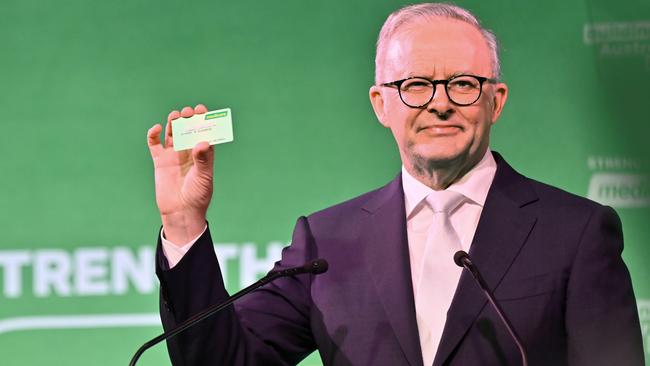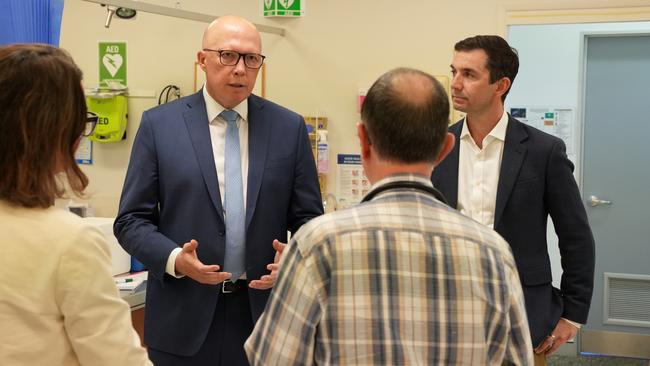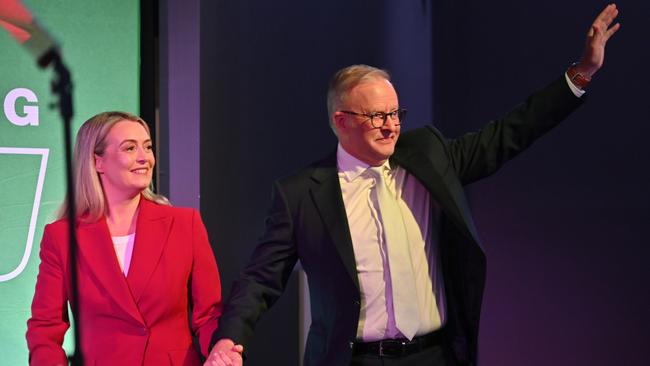Peter Dutton moves to outbid Anthony Albanese on Medicare spending splurge before election
Peter Dutton has raised doubts about the Coalition’s commitment to fiscal prudence after immediately outbidding Labor’s $8.5bn spending splurge on Medicare without any detail on how it would be paid for.

Peter Dutton has raised doubts about the Coalition’s commitment to fiscal prudence after immediately outbidding Labor’s $8.5bn spending splurge on Medicare without any detail on how it would be paid for, with economists warning there is no sign either major party has a plan to fix the budget.
In an attempt to neutralise Anthony Albanese’s rehash of Bill Shorten’s 2016 Mediscare campaign, the Opposition Leader said he would put a “historic $9bn into Medicare” and urged Labor to spend more on health.
Mr Dutton matched the $8.5bn Labor is spending to dramatically increase the take-up of bulk-billing and training healthcare workers, while also urging Mr Albanese to adopt a previously flagged Coalition plan to spend an extra $500m on taxpayer-funded mental health sessions.
Neither Mr Albanese nor Mr Dutton have outlined how the increased spending – to hit $2.4bn a year by 2028-29 – would be paid for, raising the likelihood it would add to the structural budget deficit.
After Mr Albanese used a major pre-election speech to accuse Mr Dutton of planning on “cutting bulk billing off at the knees”, the Liberal leader demanded Labor deliver a budget on March 25 so legislation could be passed to bake in the extra funding for Medicare.
Mr Albanese is expected to cancel the March 25 budget and hold an election on April 5 or 12, with government sources arguing legislation is not needed to implement the funding reforms.
“I think the Prime Minister is running from a budget because he doesn’t have a good story to tell,” Mr Dutton said.
“We should make sure that the parliament sits so that we can pass the legislation to guarantee this funding. And that can happen unless the Prime Minister runs to an early election.”

When asked what his plans were to tackle some of the structural budget issues, Mr Dutton pointed to the Coalition’s support for Labor reforms to reduce spending growth in the NDIS and aged care. Jim Chalmers said $5.4bn of the funding was included in the mid-year budget update that saw deficits blow out by $22bn in the next four years, meaning $3bn of the package has not yet been accounted for.
The Treasurer did not say whether Labor would cut spending or raise revenues to offset the budgetary impact of the Medicare package.
“We’ll have the best combination of budget improvements and investments like this one,” Dr Chalmers told the ABC.
“We’ve found $92bn worth of savings in the budgets, we’ve banked most of the upward revisions to revenue from a stronger labour market and good commodity prices. We’ve delivered … two surpluses.”
Economist Chris Richardson said both Labor and the Coalition were being fiscally irresponsible by making big spending commitments without offsets.
“If you are looking for politicians behaving badly right now in Australia, you don’t have to look far. And they are all in it together, boots and all,” he said.
“The long-term loser here is the ordinary Australian because both sides are promising up a storm of goodies without offsetting savings.
“To misquote Paul Keating: never stand between a politician and an election.”

Mr Richardson said the Coalition needed to release more policies that backed up Mr Dutton’s claim to be a responsible economic manager.
“Both sides are making permanent promises on the back of temporary budget good luck,” he said. “This is a very old and very dumb mistake.”
Opposition Treasury spokesman Angus Taylor – who vowed to consider how to fund the Medicare package “over the next little while” – said the Coalition had opposed $100bn of spending announcements in this term of parliament. “Adding 36,000 Canberra-based public servants, investing in so-called manufacturing projects that are not in manufacturing whatsoever. We’ve said no to all of those things,” Mr Taylor told Sky News.
KPMG chief economist Brendan Rynne said Mr Albanese and Mr Dutton appeared to be going to the election with “magic pudding budgets”.
“Clearly people are talking about what they are going to be providing to the Australian community but not necessarily explaining how it will be paid for,” Dr Rynne said.
AMP chief economist Shane Oliver said the election campaign was turning into a “spendathon”.
“We know the budget has a big structural problem and we are heading back into large deficits driven by excessive government spending and there seems to be a lack of commitment to winding it back in,” Dr Oliver said.
“These things are all nice to have and many would welcome it, but unless we can find a way to fund then it becomes unsustainable.”
At a pre-election rally in the Tasmanian seat of Bass, Mr Albanese said a Dutton government would “break bulk billing and break the promise Medicare is built on”.
“They will strip Medicare of everything it means to people and all that matters to our country,” Mr Albanese said.
As he unveiled a plan for 90 per cent of GP visits to be fully covered by the taxpayer by 2030, Mr Albanese used Mr Dutton’s record as health minister in the Abbott government to claim it was only a re-elected Labor government that would protect Medicare.
“In 10 years, the Liberals turned bulk billing from a service you could count on, to something you have to search for. And that wasn’t an accident born of their neglect or their incompetence – it was their goal all along,” Mr Albanese said.
“(Dutton) wanted to impose a medicine tax.
“A hospital tax on every Australian who had to seek care at an emergency department.
“And when he couldn’t get his way, he launched a six-year freeze on Medicare rebates for GPs that stripped away billions.
“Remember that, next time you hear the Liberals talk about getting ‘back on track’.”
Mr Albanese said the only thing that has changed about the Coalition since the 1980s was that they were no longer open about wanting to abolish Medicare.
The $8.5bn package will see an expansion of the bulk billing incentive so it for the first time applies to all Australians, while there will also be a 12.5 per cent loading payment for practices that exclusively bulk bill.
The bulk billing incentive – which was tripled by Labor in 2023 at a cost of $3.5bn – is currently a special top-up payment of between $21.35 and $41.10 to doctors who provide Medicare-funded consultations with pensioners, concession card holders and families with children.
The government expects the policy, to begin in November, to deliver an extra 18 million taxpayer-funded GP visits a year, lifting the bulk billing rate from 77 per cent to 90 per cent by the end of the decade.
Labor is forecasting patients will save $859m a year on doctor visits by 2030, with the number of fully bulk billed practices to triple to 4800.
The policy will also include funding for the training of 2000 new GPs a year by 2028, as well as 400 nursing scholarships.
Under the funding increase, total payments to doctors who bulk bill could increase by 62 per cent for a standard consultation in a capital city, from $42.85 to $69.56.
This would increase to $80.71 for a consultation in a regional centre, $84.86 in a small rural town and $86.91 in a remote area – a boost of between 93 per cent and 103 per cent for doctors in the regions.





To join the conversation, please log in. Don't have an account? Register
Join the conversation, you are commenting as Logout